Kaapo Kakko has signed a two-year extension with the Rangers with an average annual value of $2.1 million. Kakko finished the 2021-22 season with 18 points in 43 games, which would have been a 34-point pace over 82 games. He played the majority of his even-strength minutes on scoring lines last season, yet he hasn't quite lived up to expectations as the second overall pick in 2019.
I think patience will be required for another season or two on Kakko, though. Due to COVID-shortened seasons and wrist surgery, Kakko has played fewer than 50 games over the past two seasons, giving him 157 career NHL games. On top of that, Kaako is a borderline bigger forward (6-3, 205), so he may need additional time to develop. Kaako is also only 21 years of age, even though he's been in the NHL for three seasons. There's potentially a buy-low opportunity if the league member rostering Kakko is growing impatient.
Breakout Threshold (BT) – Using Career Games Played to Determine Breakout Potential
–
The Senators have signed Mathieu Joseph to a four-year contract worth just under $3 million per season. You may recall that Joseph was picked up near the trade deadline last season from Tampa for Nick Paul. Following the trade to Ottawa, Joseph went on a tear, scoring 12 points in 11 games before he missed the final nine games because of an injury. That success might be more difficult to come by next season, as the Sens have added Claude Giroux and Alex DeBrincat this offseason. If the scoring is spread over three lines, Joseph might have some success in fantasy leagues.
–
The Hurricanes have signed Ethan Bear to a one-year contract worth $2.2 million. Bear finished with 14 points in 58 games after being traded from the Oilers last summer. Bear will likely have to work his way onto the Canes as a bottom-pair defenseman, as both Brent Burns and Brett Pesce are the right-handed defensemen ahead of him on the depth chart, while the Canes have also acquired Dylan Coghlan from Vegas.
–
Earlier this week, the Sharks hired former Rangers coach David Quinn to be their new head coach. I discussed the Sharks' salary cap plight when I broke down the dismissal of Bob Boughner, who Quinn replaces.
Now that they have a new coach and Burns has been traded to Carolina, the Sharks are in a bit of a different place. It seemed redundant for the Sharks to have both Burns and Erik Karlsson, both right-shot defensemen. Now Karlsson has a new coach and probably all the power-play responsibility that he wants. Both Tony DeAngelo and Adam Fox thrived under Quinn, so maybe there's hope for Karlsson. He just has to find a way to stay away from injured reserve. Karlsson has played fewer than 60 games in each of his four seasons in San Jose. Granted, he played 52 games in the 56-game 2020-21 season, so he was "mostly" healthy for one of those seasons.
As far as who replaces Burns on the first-unit power play, it's most likely going to be a forward. Alexander Barabanov is one option, as he has played in nearly half of the Sharks' power-play minutes already. Long-term, William Eklund will probably be there, although it would of course depend on him making the team.
–
The Flames/Panthers trade from last week will be discussed for many years on many different levels. One team being pretty well forced to trade its young star, with the other team using the opportunity to acquire said player for two other players with only a year left on their contracts. No matter what your opinion is about who came out on top, these trades take years to play out before a real winner can be determined.
In evaluating the trade, a comparison of Jonathan Huberdeau and Matthew Tkachuk is inevitable. I'll take the opportunity to do that from a fantasy perspective. Both players are in the top 25 in both the Top 300 Skaters (keeper rankings) and the Top 100 Roto (non-keeper rankings). But do we have it right in both formats? What about after the trade?
I'll use the Player Compare feature on Frozen Tools to help. For the full player comparison, click here.
First, a simple comparison of points. Here's last season's (2021-22) totals.
| Name | GP | G | A | PTS | PTS/G |
| JONATHAN HUBERDEAU | 80 | 30 | 85 | 115 | 1.44 |
| MATTHEW TKACHUK | 82 | 42 | 62 | 104 | 1.27 |
You could argue that both players won't reach those lofty heights again. Yet in spite of Huberdeau's point total being higher, Tkachuk is the player who is more likely to regress based on advanced stats. Screenshots are from each player's Player Card, a new feature on Frozen Tools. Huberdeau's is all blue, which indicates production as expected. Tkachuk has some orange on multiple categories, which indicates possible regression.
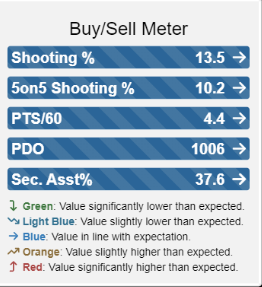
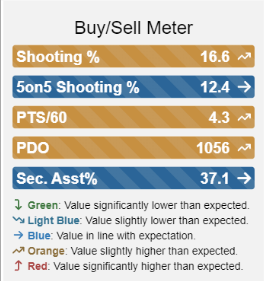
The three-year comparison on points shows an even greater points-per-game disparity, which displays why Tkachuk's 2021-22 production was a little higher than expected.
| Name | GP | G | A | PTS | PTS/G |
| JONATHAN HUBERDEAU | 204 | 73 | 181 | 254 | 1.25 |
| MATTHEW TKACHUK | 207 | 81 | 127 | 208 | 1.00 |
This scoring data also validates Huberdeau's higher overall ranking in a pure points league over Tkachuk. Even if Tkachuk has moved to a higher-scoring team, regression from 104 points seems inevitable. Huberdeau's scoring in Calgary could also drop from playing around a forward group that isn't as deep as Florida's, but I'd still expect him to come out ahead of Tkachuk in the scoring race. The Panthers scored over a half goal more per game than the Flames last season.
Now let's compare the two players from a multicategory standpoint.
| Name | GP | G | A | PPP | SOG | +/- | Hits |
| JONATHAN HUBERDEAU | 80 | 30 | 85 | 38 | 222 | 35 | 99 |
| MATTHEW TKACHUK | 82 | 42 | 62 | 29 | 253 | 57 | 93 |
Of course, true value will depend on which categories you use, but I'm using the same categories that are used for the Top 100 Roto Rankings. Tkachuk comes out higher in goals, but Huberdeau more than makes up for that in points. With goals and assists being separate categories, the scoring ends up closer than you'd think. The rest of the stats might come out fairly evenly, but are you as surprised as I am that Huberdeau had more hits than Tkachuk last season? Let's see how that looks over three seasons.
| Name | GP | G | A | PPP | SOG | +/- | Hits |
| JONATHAN HUBERDEAU | 204 | 73 | 181 | 91 | 496 | 52 | 201 |
| MATTHEW TKACHUK | 207 | 81 | 127 | 63 | 592 | 58 | 347 |
That's more like it in terms of hits. The plus/minus will depend on which team is better, which if projecting today is more likely to be Florida. Tkachuk has an edge in shots on goal and a slight edge in goals, but Huberdeau has considerably more assists and power-play points. Although one could argue that Tkachuk is a stronger roto player because of the peripheral categories, this is very close because of Huberdeau's superior scoring (which counts for more because it is harder to replace on a waiver wire). I currently have Huberdeau at #6 and Tkachuk at #21 in the July Roto Rankings, but I will be moving them closer together for the August rankings.
–
Follow me on Twitter @Ian_Gooding for more fantasy hockey.


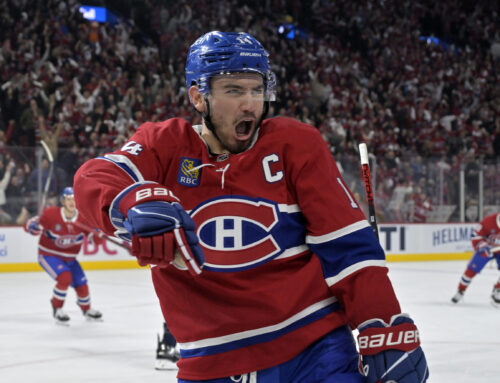
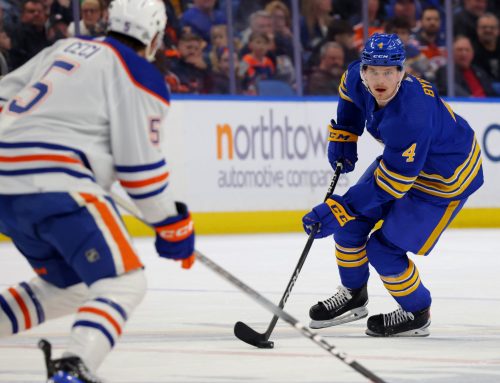
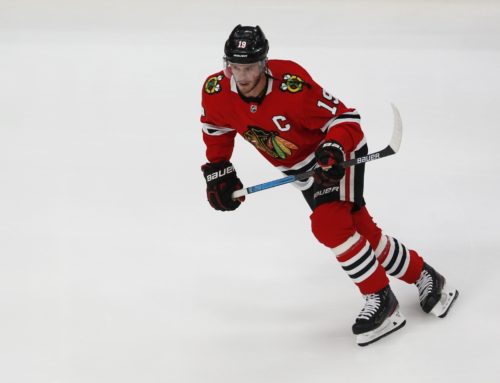
 PHI
PHI ANA
ANA VAN
VAN DET
DET BUF
BUF NYR
NYR MIN
MIN WPG
WPG
